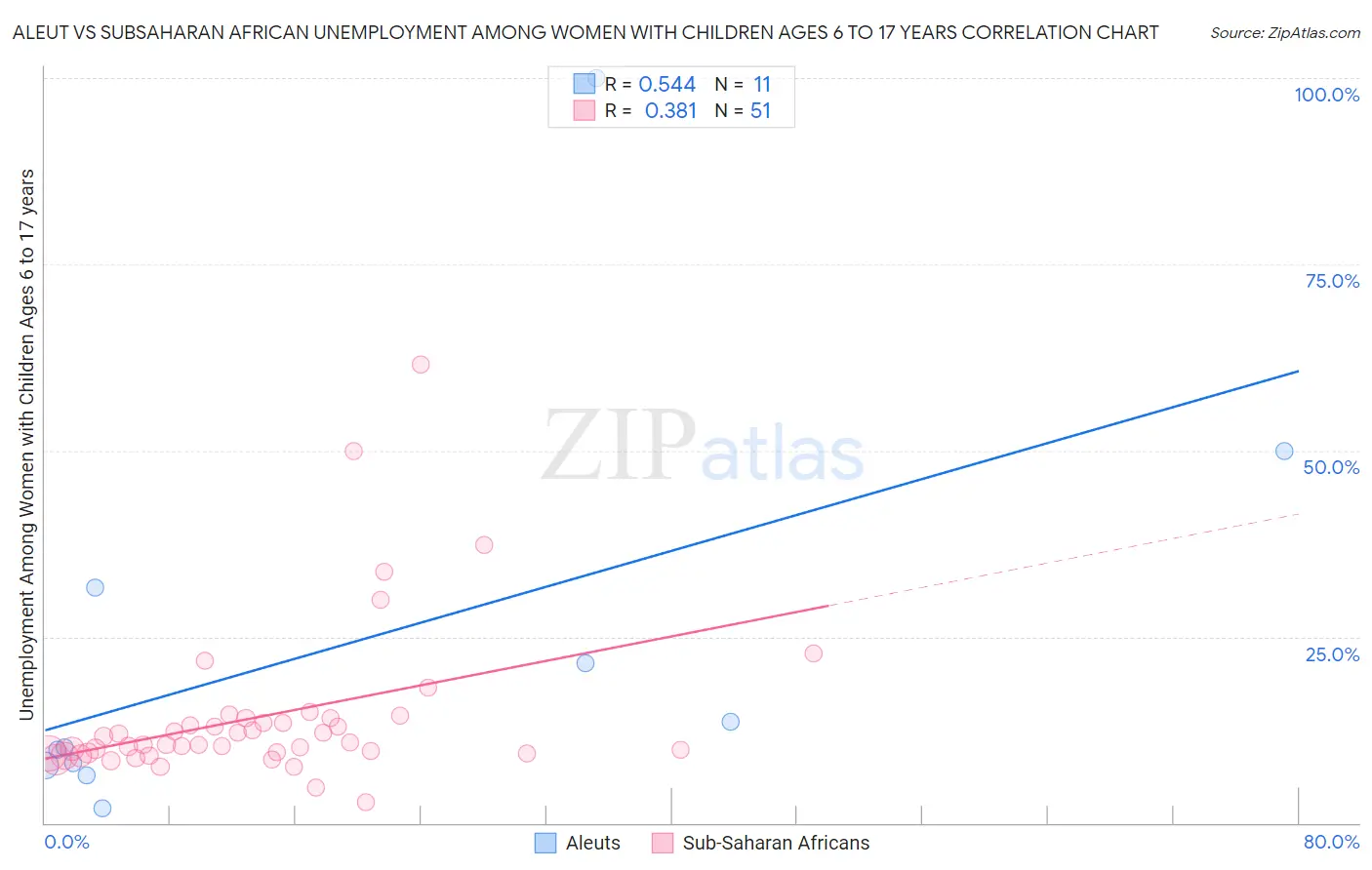Aleut vs Subsaharan African Unemployment Among Women with Children Ages 6 to 17 years
COMPARE
Aleut
Subsaharan African
Unemployment Among Women with Children Ages 6 to 17 years
Unemployment Among Women with Children Ages 6 to 17 years Comparison
Aleuts
Sub-Saharan Africans
9.6%
UNEMPLOYMENT AMONG WOMEN WITH CHILDREN AGES 6 TO 17 YEARS
0.1/ 100
METRIC RATING
274th/ 347
METRIC RANK
10.0%
UNEMPLOYMENT AMONG WOMEN WITH CHILDREN AGES 6 TO 17 YEARS
0.0/ 100
METRIC RATING
290th/ 347
METRIC RANK
Aleut vs Subsaharan African Unemployment Among Women with Children Ages 6 to 17 years Correlation Chart
The statistical analysis conducted on geographies consisting of 54,998,269 people shows a substantial positive correlation between the proportion of Aleuts and unemployment rate among women with children between the ages 6 and 17 in the United States with a correlation coefficient (R) of 0.544 and weighted average of 9.6%. Similarly, the statistical analysis conducted on geographies consisting of 345,149,119 people shows a mild positive correlation between the proportion of Sub-Saharan Africans and unemployment rate among women with children between the ages 6 and 17 in the United States with a correlation coefficient (R) of 0.381 and weighted average of 10.0%, a difference of 3.7%.

Unemployment Among Women with Children Ages 6 to 17 years Correlation Summary
| Measurement | Aleut | Subsaharan African |
| Minimum | 1.9% | 2.8% |
| Maximum | 100.0% | 61.5% |
| Range | 98.1% | 58.7% |
| Mean | 23.7% | 14.3% |
| Median | 10.1% | 10.5% |
| Interquartile 25% (IQ1) | 7.7% | 9.4% |
| Interquartile 75% (IQ3) | 31.6% | 14.0% |
| Interquartile Range (IQR) | 23.9% | 4.6% |
| Standard Deviation (Sample) | 28.9% | 10.6% |
| Standard Deviation (Population) | 27.5% | 10.5% |
Demographics Similar to Aleuts and Sub-Saharan Africans by Unemployment Among Women with Children Ages 6 to 17 years
In terms of unemployment among women with children ages 6 to 17 years, the demographic groups most similar to Aleuts are White/Caucasian (9.6%, a difference of 0.050%), Kiowa (9.6%, a difference of 0.060%), U.S. Virgin Islander (9.7%, a difference of 0.44%), Immigrants from Portugal (9.7%, a difference of 0.44%), and British West Indian (9.7%, a difference of 0.50%). Similarly, the demographic groups most similar to Sub-Saharan Africans are Honduran (10.0%, a difference of 0.010%), Nonimmigrants (10.0%, a difference of 0.020%), Carpatho Rusyn (10.0%, a difference of 0.030%), Shoshone (10.0%, a difference of 0.44%), and Sierra Leonean (9.9%, a difference of 0.68%).
| Demographics | Rating | Rank | Unemployment Among Women with Children Ages 6 to 17 years |
| Kiowa | 0.1 /100 | #272 | Tragic 9.6% |
| Whites/Caucasians | 0.1 /100 | #273 | Tragic 9.6% |
| Aleuts | 0.1 /100 | #274 | Tragic 9.6% |
| U.S. Virgin Islanders | 0.1 /100 | #275 | Tragic 9.7% |
| Immigrants | Portugal | 0.1 /100 | #276 | Tragic 9.7% |
| British West Indians | 0.1 /100 | #277 | Tragic 9.7% |
| French | 0.1 /100 | #278 | Tragic 9.7% |
| Scotch-Irish | 0.1 /100 | #279 | Tragic 9.7% |
| Seminole | 0.1 /100 | #280 | Tragic 9.7% |
| Jamaicans | 0.0 /100 | #281 | Tragic 9.8% |
| Slovaks | 0.0 /100 | #282 | Tragic 9.8% |
| Central American Indians | 0.0 /100 | #283 | Tragic 9.9% |
| Yakama | 0.0 /100 | #284 | Tragic 9.9% |
| Hispanics or Latinos | 0.0 /100 | #285 | Tragic 9.9% |
| Choctaw | 0.0 /100 | #286 | Tragic 9.9% |
| Sierra Leoneans | 0.0 /100 | #287 | Tragic 9.9% |
| Shoshone | 0.0 /100 | #288 | Tragic 10.0% |
| Hondurans | 0.0 /100 | #289 | Tragic 10.0% |
| Sub-Saharan Africans | 0.0 /100 | #290 | Tragic 10.0% |
| Immigrants | Nonimmigrants | 0.0 /100 | #291 | Tragic 10.0% |
| Carpatho Rusyns | 0.0 /100 | #292 | Tragic 10.0% |